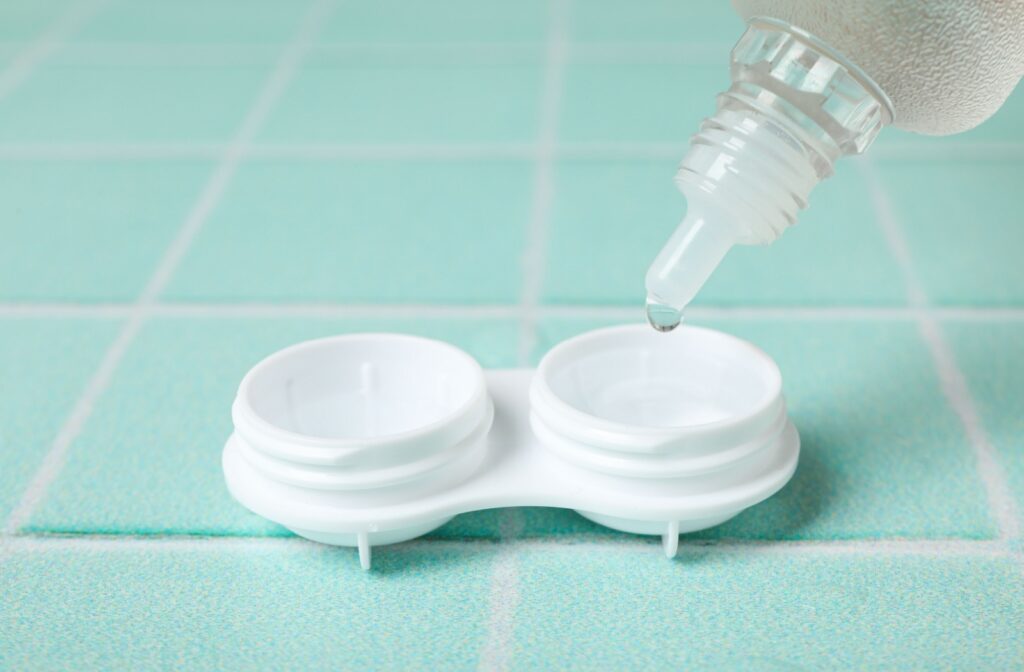If you wear contact lenses, you know that proper care is a big part of your daily routine. From routine contact lens exams and fittings to daily cleaning, it’s a commitment. The duration for which your lenses can remain in their solution depends on the type of solution, type of contact lens, and whether the case is sealed.
Typically, contact lenses can be stored in a sealed, clean case with fresh solution for a limited time. It is best practice to check your solution’s instructions for exact guidance. If your lenses have been stored for several days, always clean and disinfect them again with fresh solution before wearing them. And be sure to follow your expiration dates, as wearing expired contact lenses can be risky.
The General Rule for Contact Lens Storage
The length of time you can safely store your contacts in solution depends on a few factors. The type of solution you use and whether the case is properly sealed are the most important. Always start by reading the instructions on your contact lens solution box for specific recommendations.
How Long Can Lenses Stay in a Case?
The safe storage time for contact lenses depends on the type of lenses you wear. If you are ever unsure, check with your optometrist.
Daily Disposable Lenses
These lenses are designed to be worn once and then discarded. They should never be stored in a case, even for a few hours. Using daily lenses beyond their intended wear can increase the risk of eye irritation and infection.
Bi-Weekly Lenses
Bi-weekly lenses can be worn multiple times over a period of 2 weeks. When not in use, they can be stored in a clean, sealed case with fresh solution. However, once the 2-week period is over, the lenses must be discarded—even if they were only worn once during that time. Using them past their recommended schedule can lead to discomfort or complications.
Monthly Lenses
Monthly lenses follow a similar principle. They can be stored safely in a sealed case with fresh solution when not in use, but must be discarded after one month from the first use, regardless of how many times they were actually worn. Wearing them beyond this period increases the risk of eye infections and other complications.
No matter the type of lens, always clean and disinfect reusable lenses before each wear, and follow the recommended replacement schedule to protect your eye health.
What About an Opened Case?
You should never leave your lens case open when storing your contacts. An open case exposes the lenses and solution to airborne germs, dust, and other debris. If this happens, it’s safest to discard the lenses rather than risk eye irritation or infection. Always keep your case tightly closed to maintain a clean environment for your lenses.
Types of Contact Lens Solution and Storage Times
Not all solutions are the same, and the type you use affects how you store your lenses. The solution you need often depends on the type of contact lenses you wear, as some materials require specific care. The 2 most common solution types have different rules you need to follow for safe wear. Understanding your solution is the first step toward proper lens care.
Multipurpose Solutions
This is the most popular type of solution because it cleans, rinses, disinfects, and stores your lenses all in one bottle. Always follow the product label for specific storage and wear instructions.
Hydrogen Peroxide-Based Solutions
These systems offer a deep clean but require a special case with a neutralizing disc. You must let the lenses soak for at least 6 hours to allow the peroxide to become a harmless saline. Once neutralized, the storage rules are similar to those for multipurpose solutions.

What to Avoid with Contact Lens Solution
Good habits are key to comfortable and safe contact lens wear. Poor habits can lead to discomfort or more serious eye health issues. Here are a few things you should never do with your lenses and solution.
Reuse Old Solution
Never “top off” the old solution in your case with new solution. Always empty the old liquid, rinse your case with fresh solution—not water—and let it air dry. Reusing old solution reduces its ability to disinfect your lenses effectively.
Makeshift Storage Solutions
If you run out of solution, you cannot use water, saliva, or any other liquid as a substitute. These can introduce harmful bacteria to your lenses and may cause serious eye infections. If you experience sudden pain or redness after a storage mishap, it might require emergency eye care. It’s always better to throw the lenses away than to store them improperly.
Risks of Improper Contact Lens Storage and Wear
When you don’t follow proper care instructions, you put your eye health at risk. From simple irritation to more serious problems, correct lens care is a small step that makes a big difference. Pay attention to how your eyes feel each day.
What Happens if You Forget to Remove Your Lenses?
Sleeping in lenses that are not approved for overnight wear can deprive your cornea of oxygen. This can lead to irritation, redness, and a higher risk of infection.
Similarly, wearing lenses while swimming, whether in a pool, lake, or hot tub, can expose your eyes to bacteria and other harmful microorganisms. Always follow the wear schedule recommended for your specific type of lenses, and remove them before swimming to protect your eye health.
Signs of Eye Irritation or Infection
If your eyes don’t feel right, it’s time to pay attention. Stop wearing your contacts and get in touch with your eye care professional if you notice any signs of irritation. Be aware of any of these signs:
- A stinging, burning, or scratchy sensation
- Eye redness
- A sense of something in your eye
- Blurred vision
- Light sensitivity
- Watery eyes
Contact Lens Health and Overall Eye Care
Taking care of your contact lenses is an important part of your bigger eye health picture. Regular check-ins with an eye care professional help you maintain clear and comfortable vision. These visits are also a chance to update your care routine.
Contacts and Dry Eye Symptoms
Improper lens wear can sometimes lead to symptoms of dry eye. If your lenses are not clean or you wear them longer than recommended, it can cause discomfort. If you experience persistent dryness or irritation, you may benefit from dry eye therapy.
The Role of Regular Eye Exams
Annual eye exams are important for everyone, especially contact lens wearers. A visit to your eye doctor goes beyond just checking your vision; it’s a chance to confirm your lenses fit correctly and assess your overall eye health.
Healthy Habits for Happy Eyes
Following these simple storage rules can help you enjoy clear and comfortable vision with your contact lenses. Our Total Vision Carlsbad Plaza team is here to support your eye health. Schedule an appointment with us to discuss your vision needs.



